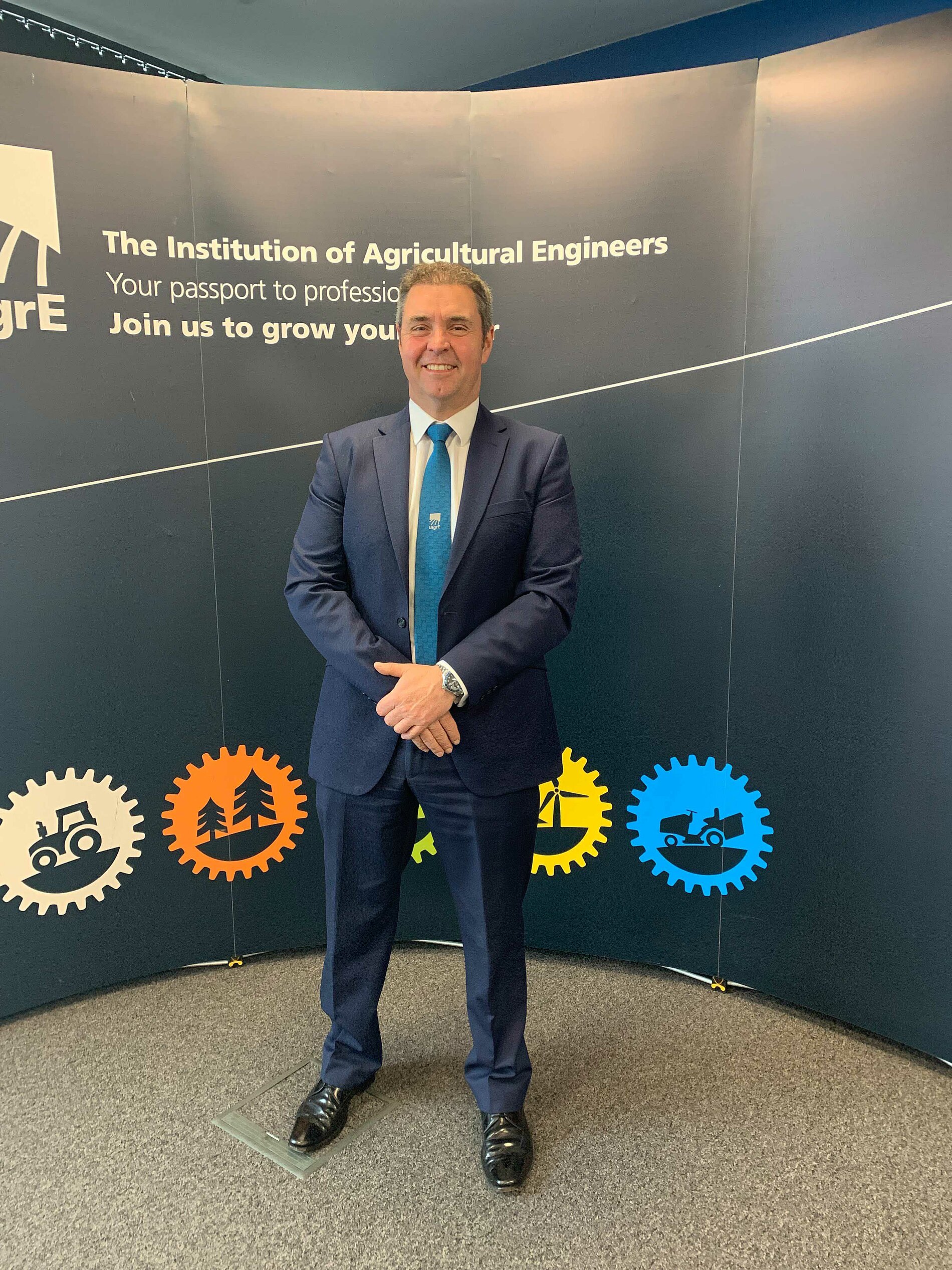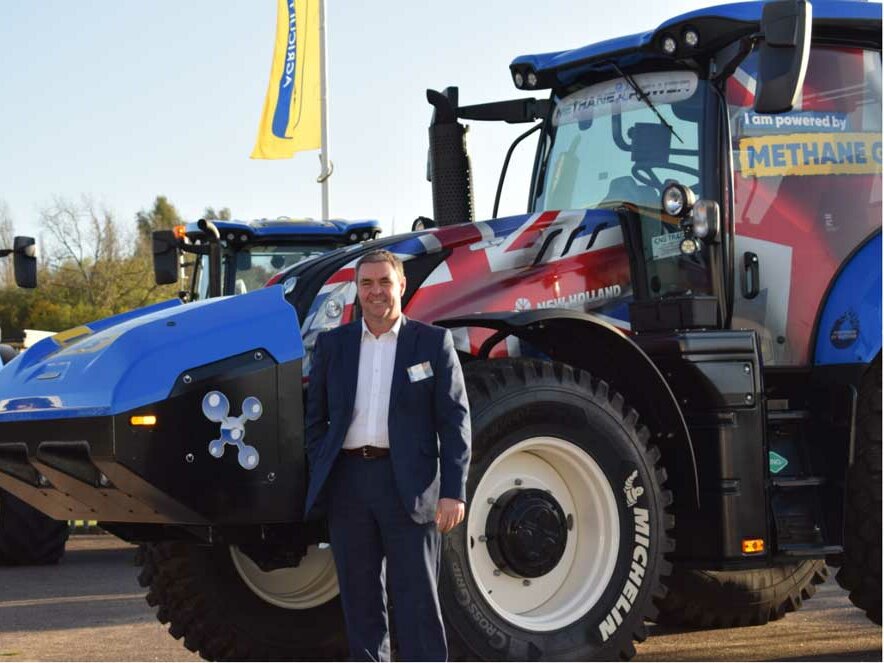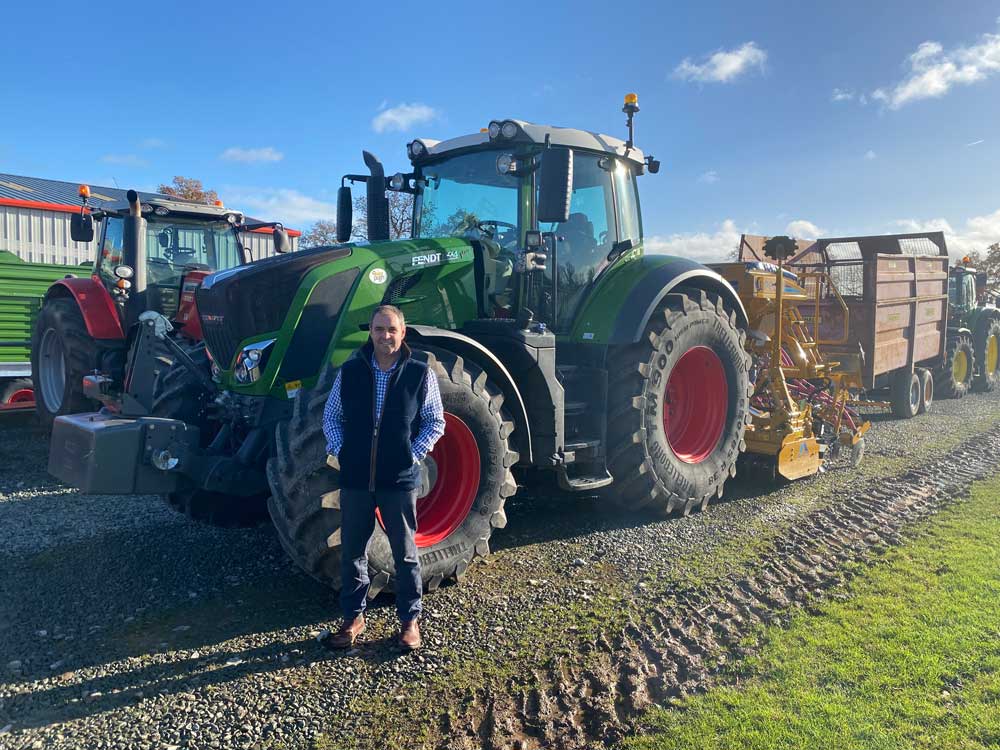Charles Nicklin: DLG has become the benchmark for testing of agricultural machinery
Interview by Erminia Ciarleglio, DLG
Mr. Charles Nicklin is a Chartered Engineer and currently runs the UK’s Institute Institution of for Agricultural Engineering (IAgrE).
Prior to that he worked in JCB where he held various engineering leadership roles, including being a Chief Engineer for 15 years up until June 2020. He has worked in JCB product engineering for 25, including 9 years on telehandlers, 11 years on tractors and just under 5 years on backhoe loaders. He has is also from a farming background and has a strong interest in vintage tractors and competition ploughing.
How does the IAgrE aim to contribute to the advancement of agricultural engineering in the UK?
As many will know, agricultural engineering is a very broad subject, which not only includes tractors and farm machinery, but also soil science, livestock systems and horticulture to name a few. IAgrE brings together all those involved such as engineers, scientist, students and academics, the common theme is always the land. We’re a close knit industry, and being part of IAgrE is a great way of networking across many different businesses and sectors
As a professional institution we put on a variety of content for our members, such as conferences, seminars, awards, podcasts, etc. We publish the Landwards journal for our members, a quarterly publication packed with articles covering many diverse areas, from student projects to ground breaking agri-tech. We also own and publish a leading international academic journal Biosystems Engineering.
We are licensed by both the Engineering Council and the Society for the Environment to award professional recognition, such as CEng. We provide support for education and training in our sector such as recognition and accreditation of training courses, apprenticeships, degrees, etc. and we advise on course content to ensure the learning material is right for industry.
What is your experience as a product developer? What challenges do you face?
Coming up with designs and developing machines into serial production is incredibly challenging, and also very rewarding. One of the things that kept me in engineering is that its one of the only roles where you have a real detailed input into the products created. It’s a great feeling watching trucks leave the factory carrying something you’ve created on route to customers who have paid their hard earned cash to buy.
There are plenty of challenges on a product development journey, I still think the hardest of them all is getting something going down a production line time after time at the right quality; building one off’s is easy, building 100 machines a day to the right quality levels takes some doing. As an engineer, you generally only get called on when things have gone wrong, but you get great satisfaction sorting problems out and keeping those wheels rolling.
Seeing the evolution of products with basic electrical systems move towards complex electronics has been an interesting journey. Electronics can bring fantastic benefits to machines, but ensuring reliability and robustness is a real challenge. I’ve heard many a supplier tell us that it works perfectly well on a truck or a car, but the farm environment is so much different and can create many more challenges. People often say machines have got too complex, but the reality is customers are wanting highly refined transmissions and hydraulics, comfortable climate controlled cabs and excellent brakes and suspension, none of this can be achieved with complex electronic systems. The biggest challenge I faced with electronic systems is trying to find electronics engineers to work on them, not only do they need to know their subject, but they also have to understand what tractors do, the environment they operate in and what operators want. Electronics engineers are in huge demand and the agricultural engineering sector needs to recruit more of them into it.
What do you see as the key trends and future directions for agricultural engineering?
I’m a tractor and machinery guy, so my views are quite biased. Ag engineering is so much more than tractors and combines though, it includes soils, irrigation, livestock, crops and the list goes on. Its such an exciting broad industry and I think the biggest issue we have is making the career roles visible to young people.
However, from a machinery perspective we’re in some exciting times. Just look at powertrains, 10 years ago anything from 20kW to 500kW was diesel, now look forwards and what will it be? There is so much change going on, its really exciting for engineers.
Precision ag techniques continue to be key and I think this trend has to continue, coupled with more efficient agricultural process that work in harmony with the environment. Its absolutely essential we use the resources effectively, we have to reduce fertilizer and chemical use, we have to improve land use, we have to be kinder to the environment; these are non-negotiable. We cannot keep clearing forest to make agricultural land, and in the developed countries we want to continue to build houses for a growing population. We’re all going to need to eat and its agriculture that feeds us, we have no choice but to produce more with less, and its engineers that will come up with the answers.
There seems to be no signs of equipment getting smaller, despite what the agri-robot builders think. On an Agritechnica show stand you can see a small electric autonomous robot (or driverless tractor!) on one side and a 500kW 4WD tractor on the other! In reality I’m sure we’ll have both, we need the acre-eating large powered tractors and combines to cover the vast amounts of ground quickly, but there is certainly a place for smaller autonomous vehicles doing tasks like mechanical weeding, fruit picking, crop scouting, etc.
I think this decade will be so exciting for an engineer to be involved in agriculture.
Are there specific initiatives to encourage the development of environmentally friendly technologies?
There are significant amounts of grant funding available for developing and/or investing in “agri-tech”. I can’t say I’m a fan of the term, I even hear people refer to “agri-tech engineering”, we could have simply stayed with agricultural engineering to reduce confusion.
There are lots of start-ups trying to develop solutions either on their own by securing funding or through incubation hubs supporting them and aiding collaboration to get their ideas off the ground. Transitioning these ideas into a commercially viable product through to serial production is incredibly difficult. Some innovations are maybe a little ahead of their time and farmers are nervous of adopting, other ideas may just not be commercially viable and fail. Whatever the process or product, it needs to add value to the farms business, either by saving money and time, or increasing profit and efficiency. I’ve a very practical upbringing, so I can be quite skeptical of ideas, I simply translate it back to whether the solution could actually work in the real world.
There is lots of discussion around green skills, green jobs, etc. but unless you are actually directly involved in some form of climate/environmental role, all jobs should have “green” running through them. Whether your designing machines or growing crops, you should be very aware of the environmental impact of your work. I think accessing the funding in the UK can be tricky and its worth engaging with professionals who know the systems and procedures to help you get what you need.
From your dual perspective as an engineer and your farming background, what would you change as a farmer today?
I’m very envious of the equipment available these days, the technology is fantastic on modern tractors and harvesters. When everything is running as it should the machines must be a joy to use.
However, I’m sure farmers can get really frustrated with the integration of systems from different manufacturers. Things like ISOBUS connectivity have come on leaps and bounds over the years, and continues to improve. Initiatives driven by the AEF (Agricultural Electronics Foundation) have greatly improved connectivity between the different brands. I don’t see this as an issue, I think its at the farm management level software where the challenges are. The transfer of data back and forth between tractors, harvesters and the farm office needs to be much easier, especially when you mix in different brands. Some OEMs do it really well, but will of course push you to use their full range of equipment. There is just so much data available now it must be overwhelming, but getting the right information at the right time can be a challenge. As a farmer you need to be focused on your role, not wasting time being a systems integrator, the working hours are long enough already.
Another area is carbon, there is so much talk about it in terms of sequestration and release from soils. If we intend to be net-zero on carbon release then we need some clear focus on it and measurement standards. Min-till, no-till and ploughing are constantly discussed, all have their benefits and drawbacks. Labour and fuel saving have driven much of the change, but soil health is very much in focus. 70 years ago we shallow ploughed, you could argue that was min-till! As equipment has got bigger we plough deeper to cover the mess created, we’ve created a viscous circle. The focus has to be soil health, including carbon and choosing the right process.
What do you expect from DLG membership, what do you appreciate most at our trade fairs?
To be honest, as a UK person, DLG membership for me is about accessing information, attending the Hanover Agritechnica exhibition and the pre-show conference. In my former role we presented at the conference which was a great experience for us. Its frustrating that more UK companies don’t get involved with the conference, it’s a world stage and we should want to talk about some of the things being developed in the UK. The actual show needs few words, it’s the largest in the world and again is a world stage for machinery and systems. The other important DLG service is the testing station. Disappointingly, for reasons I won’t go into, we lost our UK National Institute at Silsoe, Bedfordshire many years ago which performed all sorts of tractor testing and research. There are a handful of organisation’s that can perform things like tractor testing, but certainly not at a level comparable with the DLG which has become the benchmark. I certainly find the DLG website a useful source of information and its of value being a member.





